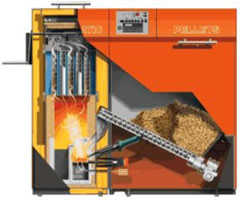pellet and wood chip boilers

Internal view of a pellet stove.
The latest generation of boilers fueled by wood pellets, corn pellets, or wood chips are highly efficient, clean burning and totally automatic, saving you time and money. Moreover they use a sustainable, renewable resource, unlike their oil or natural gas fired counterparts.
Pellet and wood chip boilers can be used to provide central heating or process heating for virtually any premises, from a family home to a large commercial or public building or an industrial process. They can be installed alongside, or to replace, existing gas, coal, or oil boilers. No modifications to the heating system are necessary.
Today, many of the small boilers on the market use a two-stage combustion process, come equipped with ceramic refractory lining, and are combined with a hot water tank for heat recovery. This kind of configuration allows the boiler to work at optimal load with sufficient air and high process temperatures independent of the heating demand. The result, over the last ten years, has been an improvement in boiler thermal efficiency from an average of 60% to 80–90% and a major drop in emission of products of incomplete combustion.
For a single family house, a pellet boiler of 8 kilowatts (27,000 BTU/hr) will burn 3,200 kilograms (7,000 pounds) of pellets to cover the heat needs over the year. This amount requires a storage space of approximately 5 cubic meters (177 cubic feet).
Key points for buyers
Safety
The main fire risk is burn back in the fuel feed and blocking in the combustion. It's vital that the boiler is equipped to prevent these problems. Ask the supplier for details of safety features and don't accept general assurances. Multiple fail-safe mechanisms are a must. They may include: temperature sensors, air locks, fuel chutes, heat reactive expandable foam, and water sprinkler systems.
It's also essential that the boiler has a control system to detect if the boiler fails to light or there's a build up of ash or clinker in the combustion chamber. Without one, the boiler might try to light while the system is blocked and flue gases can't escape. A good control system can monitor what's happening inside the system, detect the temperature of the flame, gauge the amount of fuel in the combustion chamber, and take action if anything is wrong.
Quality
Spending more for a good quality, easy-to-use, efficient boiler will save you money and time in the long run. Wood combustion is corrosive and the combustion chamber must be made from a material that doesn't corrode. It must also be designed to ensure that combustion is complete before the flue gases leave and enter the heat exchange. The thickness and type of steel used in the rest of the boiler is also important. The thicker the steel and the better the quality of welding, the less it will be affected by corrosion.
A good boiler will have an efficiency in excess of 90% and be able to regulate its output to match the heat requirement of the house without losing efficiency. It's necessary that the boiler has some way to measure combustion efficiencies, usually using a lambda probe or equivalent.
Ease of use
Check how the system clears the grate and how it cleans the heat exchange. If the boiler isn't self-cleaning, you'll have to do the task manually, which will involve regularly clearing grates and scraping heat exchangers. If you have any doubt about your ability to stick to a regular manual routine – essential to efficient and safe operation – then pay the extra for a self-cleaning system.
Sizing
It's important to calculate accurately the heat load of your home before selecting a system because a boiler operates more efficiently if correctly sized. With new buildings it's possible to apply general rules. In the case of older buildings, you may want to have a survey carried out complete with heat loss calculation based on factors such as the type of insulation and size and type of windows installed. Don't be tempted to buy a larger system just to make sure because this will result in lower boiler efficiency and higher heating bills.
